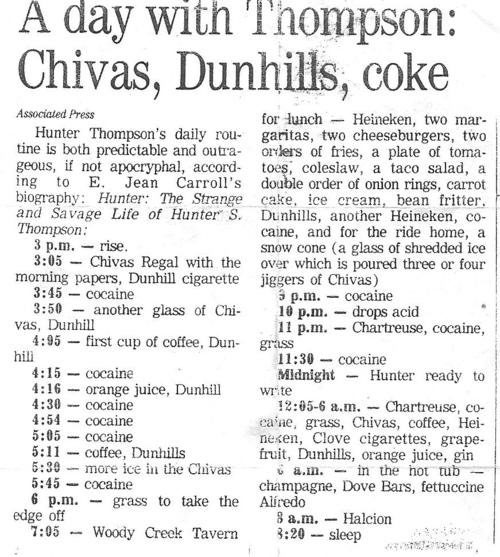[Kevin Kelly:]
The Improbable is the New Normal:
Cops, emergency room doctors, and insurance actuarists all know it. They realize how many crazy impossible things happen all the time. A burglar gets stuck in a chimney, a truck driver in a head on collision is thrown out the front window and lands on his feet, walks away; a wild antelope knocks a man off his bike; a candle at a wedding sets the bride's hair on fire; someone fishing off a backyard dock catches a huge man-size shark. In former times these unlikely events would be private, known only as rumors, stories a friend of a friend told, easily doubted and not really believed.
But today they are on YouTube, and they fill our vision. You can see them yourself. Each of these weird freakish events just mentioned can be found on YouTube, seen by millions.
The improbable consists of more than just accidents. The internets are also brimming with improbable feats of performance -- someone who can run up a side of a building, or slide down suburban roof tops, or stack up cups faster than you can blink. Not just humans, but pets open doors, ride scooters, and paint pictures. The improbable also includes extraordinary levels of super human achievements: people doing astonishing memory tasks, or imitating all the accents of the world. In these extreme feats we see the super in humans.
Every minute a new impossible thing is uploaded to the internet and that improbable event becomes just one of hundreds of extraordinary events that we'll see or hear about today. The internet is like a lens which focuses the extraordinary into a beam, and that beam has become our illumination. It compresses the unlikely into a small viewable band of everyday-ness. As long as we are online - which is almost all day many days -- we are illuminated by this compressed extraordinariness. It is the new normal.
That light of super-ness changes us. We no longer want mere presentations, we want the best, greatest, the most extraordinary presenters alive, as in TED. We don't want to watch people playing games, we want to watch the highlights of the highlights, the most amazing moves, catches, runs, shots, and kicks, each one more remarkable and improbable than the other.
We are also exposed to the greatest range of human experience, the heaviest person, shortest midgets, longest mustache -- the entire universe of superlatives! Superlatives were once rare -- by definition -- but now we see multiple videos of superlatives all day long, and they seem normal. Humans have always treasured drawings and photos of the weird extremes of humanity (early National Geographics), but there is an intimacy about watching these extremities on video on our phones while we wait at the dentist. They are now much realer, and they fill our heads.
I see no end to this dynamic. Cameras are becoming ubiquitous, so as our collective recorded life expands, we'll accumulate thousands of videos showing people being struck by lightening. When we all wear tiny cameras all the time, then the most improbable accident, the most superlative achievement, the most extreme actions of anyone alive will be recorded and shared around the world in real time. Soon only the most extraordinary moments of our 6 billion citizens will fill our streams. So henceforth rather than be surrounded by ordinariness we'll float in extraordinariness.

It's one thing to hear a story about someone getting struck by lightening, but it feels different seeing a video of it. I have a hunch that seeing "facts" on video makes them seem realer to us than either reading, hearing, or seeing stills about them. And then there are always more than one. That's the thing, you can start with the most unlikely event or achievement, and then watch a series of this unlikeliness for hours. Over time this extremism accumulates. When the improbable dominates the archive to the point that it seems as if the library contains ONLY the impossible, then these improbabilities don't feel as improbable.
I think there is already evidence that this ocean of extraordinariness is inspiring, galvanizing, prompting, daring ordinary folks to try something extraordinary. At the same time, superlative epic failures are foremost as well. We are confronted by the stupidest people in the world as well, doing the dumbest things imaginable. So we see the extremes. In some respects this is making us a world of Ripley-Believe-it-or-Not-ers, or it may place us in a universe of nothing more than tiny, petty, obscure Guinness World Record holders. Everyone is a world record something for 15 minutes. In every life there is probably at least one moment that is freakish.
To the uninformed, the increased prevalence of improbable events will make it easier to believe in impossible things. A steady diet of coincidences makes it easy to believe they are more than just coincidences, right? But to the informed, a slew of improbably events make it clear that the unlikely sequence, the outlier, the black swan event, must be part of the story. After all, in 100 flips of the penny you are just as likely to get 100 heads in a row as any other sequence. But in both cases, when improbable events dominate our view -- when we see an internet river streaming nothing but 100 heads in a row -- it makes the improbable more intimate, nearer.
I am unsure of what this intimacy with the improbable does to us. What happens if we spend all day exposed to the extremes of life, to a steady stream of the most improbable events, and try to run ordinary lives in a background hum of superlatives? What happens when the extraordinary becomes ordinary?
The good news may be that it cultivates in us an expanded sense of what is possible for humans, and for human life, and so expand us. The bad news may be that this insatiable appetite for supe-superlatives leads to dissatisfaction with anything ordinary.
I don't know, but if anyone is aware of research on this effect, I'd like to know about it.
Clay Shirky argues that the least creative act is making a LOL-cat, but that even making a LOL-cat is better than making nothing, and so the internet of LOL_cats is a net good compared to say a world of make-nothing consumption. One could make a similar argument that the least distinctive human achievement is a bad accident captured on YouTube, but that moment of uniqueness is better than no uniqueness at all, and so a world of YouTube extremities, improbabilities and superlatives is a net good.




